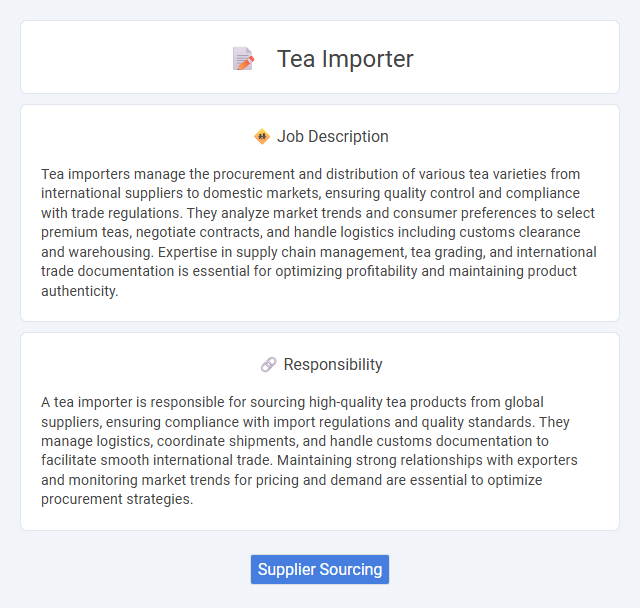
Tea importers manage the procurement and distribution of various tea varieties from international suppliers to domestic markets, ensuring quality control and compliance with trade regulations. They analyze market trends and consumer preferences to select premium teas, negotiate contracts, and handle logistics including customs clearance and warehousing. Expertise in supply chain management, tea grading, and international trade documentation is essential for optimizing profitability and maintaining product authenticity.
Individuals with strong organizational skills and attention to detail are likely to thrive as tea importers given the need to manage logistics and regulatory compliance. Those comfortable with international communication and negotiation probably find the role suitable due to frequent interactions with suppliers and customs officials. However, people who prefer routine tasks or minimal coordination may find this position challenging or less fitting.
Qualification
A Tea importer must possess in-depth knowledge of global tea varieties, supply chain logistics, and international trade regulations. Strong negotiation skills and fluency in multiple languages enhance the ability to secure quality deals and foster supplier relationships. Familiarity with customs documentation, quality control standards, and experience in market trend analysis is essential to optimize product sourcing and distribution.
Responsibility
A tea importer is responsible for sourcing high-quality tea products from global suppliers, ensuring compliance with import regulations and quality standards. They manage logistics, coordinate shipments, and handle customs documentation to facilitate smooth international trade. Maintaining strong relationships with exporters and monitoring market trends for pricing and demand are essential to optimize procurement strategies.
Benefit
A tea importer likely experiences benefits such as access to diverse, high-quality tea products that can attract various consumer preferences and increase market competitiveness. There is a strong probability of establishing international trade relationships that enhance business growth and profitability. Importers may also benefit from economies of scale, reducing costs while expanding product offerings to meet growing demand.
Challenge
A tea importer job likely involves navigating complex international trade regulations and fluctuating market demands, which may pose significant logistical challenges. Managing supply chain disruptions and ensuring consistent product quality could require continuous problem-solving and adaptability. The role probably demands cultural sensitivity and strong negotiation skills to maintain relationships with diverse suppliers across different regions.
Career Advancement
Tea importers play a crucial role in the global supply chain by sourcing high-quality tea from diverse regions such as India, China, and Sri Lanka, ensuring consistent product availability for distributors and retailers. Career advancement in this field often involves progressing from entry-level logistics and procurement roles to senior positions like Supply Chain Manager or Head of Import Operations, where strategic negotiation and market analysis skills are essential. Mastery of international trade regulations and building strong relationships with tea producers and shipping partners significantly enhance promotion opportunities and salary growth.
Key Terms
Supplier Sourcing
Tea importer professionals specializing in supplier sourcing identify and establish relationships with reliable tea growers and wholesalers globally to ensure high-quality product procurement. They conduct market analysis and assess supplier certifications, focusing on sustainable and ethically sourced tea varieties to meet consumer demands. Effective negotiation skills and thorough understanding of import regulations are crucial for optimizing supply chain efficiency and maintaining competitive pricing.
 kuljobs.com
kuljobs.com